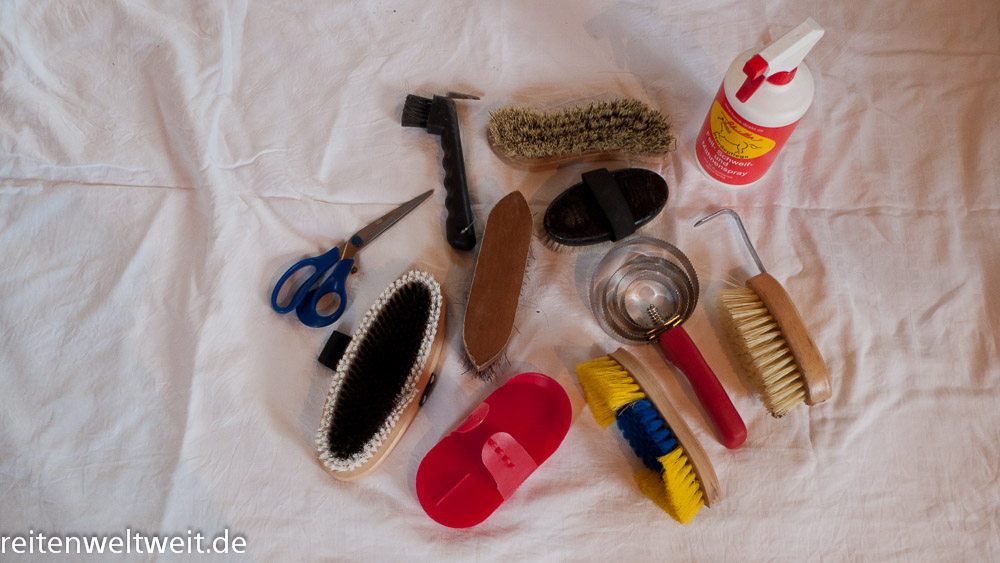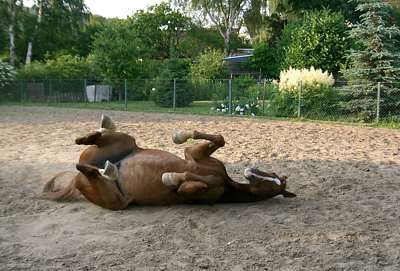Horse grooming- sometimes less is more
The wish of every horse is to simply run around the pasture and to roll in the dirt. Nowadays however, many horses have to bear a daily washing procedure which can easily do more harm than good.
Sometimes less is more
Undoubtedly we only want the best for our horses. However we need to understand that a horse is an animal- and animals live in nature and are in contact with natural dirt. Horse owners should not try to transfer their understanding of hygiene in their usual daily life on their horses.
General horse grooming
Before saddling the horse the rider always needs to brush the horse carefully. This cleaning process is a prevention against any kind of injuries because if the coat is dirty the saddle can easily chafe at it. It is crucial that the horse owner has all tools for grooming. After a long and exhausting ride in summer a cold shower can be really refreshing. However you need not make use of special shampoos or similar products (except Neem Oil Products). Commercial shampoos disturb the natural coat fat which is a natural prevention against dirt and rain. Permanent cleaning procedures of the coat effect irritations and infections because the skin gets softened and therefore delicate for insects or bacteria. The natural prevention of the skin and coat become destroyed- a fact we need to prevent in any case!
Ears and eyes need to be cleaned separately from the rest of the body. The water you already used for the rest of the body offers
bacteria and sweat and should not come in contact with these sensitive parts of the body. Instead you can use a sponge and lightly dap it on eyes and ears. With this method horses react less nervous and you prevent any possibilities for an infection. Also the legs need a special treatment. After washing the body you can take a simple towel and rub down the wet. This prevents painful grapes. In times of extreme sweating especially the skin folds between the legs and the stomach are very sweaty and require a special cleaning. Mostly also the area underneath the saddle is very sweaty. Just take a sponge, dip it into a mix of water and vinegar and then carefully clean the coat.
Rules for the right shearing
Generally shearing has positive effects for the horse. However there are certain limits and rules to consider. Before shearing you should make sure if it makes sense to take away the coat. If you train a lot in winter and your horse sweats a lot it makes sense to shear off the top hair. This prevents immense sweating and therefore a high loss of minerals. Additionally the process of drying after the ride becomes faster. In any case you should take care of the shaving foil. If they are too sharp they can easily hurt the skin and effect irritations and inflammations. It does not make sense however to shear the legs of the horse. At this part of the body the coat has important functions and prevents the animal from dangerous infections (grapes).
Never cut the whiskers of the horse!
In some countries (e.g. Germany) it is forbidden by law to cut the whiskers in the area of chin and nostrils. The whiskers of the horse are very sensitive and have an important function. Through their whiskers horses have the first contact with fodder and new objects. The whiskers of their eyes are a natural prevention against flies and other things that could hurt the horses´ eye. To sum up: Please, never cut off the whiskers of your horse!
The right cleaning the hooves
For some people it may be an aesthetic highlight so see shining and clean hooves. However too much fat, tar and other products are anything but good and can have really negative effects on the health of the hoof. If the pasture however is very wet it makes sense to lightly oil the hooves because this keeps away the wet. If you just greased the hooves we recommend to wait at least 15 minutes before guiding the horse into the box. Otherwise hay and dirt stick at the hooves and effect infections. Here you can find general information about the hooves of the horse and how to prevent a painful laminitis.
Horses have many natural protective functions which guarantee a prevention against many diseases. Horse owners should make use of them instead of destroying them. Generally one must not transfer the normal understanding of hygiene on horses. Nature did a great job and we can just make profit from it.
Surf tips:
- Neem oil for horses- prevention of insect bites and efficient substance against sweet itch
- Springtime means the first days on the pasture- but it needs some time to get the horses used to the grass
- How to minimize the risks of Laminitis
- Horses with Laminitis- Origin and Therapy
—All statements without guarantee—


2 Comments